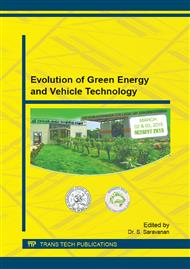p.70
p.79
p.87
p.93
p.102
p.107
p.112
p.118
p.124
A Review on the Performance of Tribological Properties of Cutting Fluids
Abstract:
Tribology deals with friction, wear and lubricants. It plays an important role in mechanical field. It finds its major application in industrial and automotive sector, in which this thesis considered the tribology in metal removal industrial sector. In that application, the role of cutting fluid in lathe machining operations have been chosen. One of the most important challenging cases is to minimize the friction in machining of titanium alloys. While machining, the heat should be minimized as low as possible. This thesis deals with the study of cutting fluids in machining of titanium alloys. The problem occurs while using mineral oil as a cutting fluid in machining that it is non-biodegradable in nature and affects the environment while disposing it. This thesis aims to identify the alternate cutting fluids instead of mineral oil, which is to be effective cooling and non-toxic to environment. For that, Machining condition should be controllable by using some grammar rule without affecting the Productivity.
Info:
Periodical:
Pages:
102-106
DOI:
Citation:
Online since:
November 2015
Authors:
Keywords:
Price:
Сopyright:
© 2015 Trans Tech Publications Ltd. All Rights Reserved
Share:
Citation:


